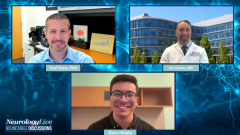
Holistic Strategies and to Promote Remyelination in MS
In this episode, a duo of neurologists examine the plausibility, limitations, and risks of holistic approaches to remyelination—and what patients should prioritize or avoid.
Episodes in this series

Despite major advancements in the treatment of multiple sclerosis (MS), including the emergence of highly effective disease-modifying therapies that target inflammation and reduce relapse rates, there remains a critical unmet need: the ability to repair damaged myelin. Remyelination—the process by which the central nervous system regenerates myelin sheaths around axons—is a key neuroprotective and potentially restorative goal in MS. While spontaneous remyelination can occur, particularly early in the disease, it is often incomplete and declines over time, contributing to irreversible neurological disability.
In recent years, an influx of research has significantly advanced our understanding of the biology of remyelination, uncovering new molecular targets, cellular mechanisms, and imaging modalities. Yet, despite promising results in preclinical models, there are still no FDA-approved therapies that directly promote remyelination. In this panel discussion, Ari Green, MD, and Paul Tesar, PhD, examine the evolving landscape of remyelination science—highlighting the translational challenges, trial design hurdles, and promising agents in development—while offering insights into the future of regenerative strategies in MS care.
In episode 6, Green and Tesar discuss the role of holistic strategies—such as exercise, diet, and supplements—in supporting remyelination in MS. While some practices like physical activity are plausibly helpful, the evidence remains limited, and patients are urged to approach alternative therapies with caution. The conversation also highlights emerging concerns around environmental toxins that may worsen oligodendrocyte loss, underscoring the importance of avoiding harmful exposures.
Transcript edited for clarity.
Marco Meglio: Are there any holistic strategies that help impact the body's natural ability to remyelinate? I know you talked about some of the myths with exercise and things of that sort. So touch a little bit upon the myths of holistic strategies, as well as if there are any that we know could potentially help remyelination.
Ari Green, MD: Yeah, so I wouldn’t say “debunking” myths with exercise—because, in fact, if there’s one thing that at least plausibly has a benefit, and there’s some evidence that it may be beneficial, it would be activity. Physical activity. Again, we don’t know how robust of an effect it might have, and as for actually demonstrated effects, there’s no strong evidence to suggest that it’s beneficial—but I do encourage every one of my patients to engage in exercise as an important component of maintaining their health.
Beyond that though—some people think of holistic strategies as supplements, or dietary changes, or things that appear “natural” to them because it’s not obviously a chemical. I think people should exercise tremendous caution. The evidence is completely lacking. I don’t think there’s any nutrient or vitamin that has been shown to have a biologically beneficial effect on remyelination. There are some that are more plausible than others, sure, but the idea that any of them necessarily have a pro-myelinating or remyelinating effect is not only unsupported—in some cases, it’s not even biologically plausible, even at the doses people are talking about.
So people should be super careful. If someone is encouraging them to take some form of a supplement—especially if the person encouraging you is also the one selling it to you—that’s a big warning sign.
Paul Tesar, PhD: I don’t have a lot to add here. I think, as a general statement, taking care of yourself and your body—exercising, getting sleep, doing things along those lines—is generally good. The evidence for those activities, on their own, enhancing remyelination still remains to be shown.
Now, I think where I could sort of flip this a little is just to say: you should also avoid things that are bad. Things that are stimulating inflammation and inflammatory disease are obviously not ideal. My lab here at Case Western Reserve University has put a lot of effort into identifying potential environmental exposures—including environmental toxins—that might contribute to oligodendrocyte loss. Some of these household chemicals, which we published on last year in Nature Neuroscience, have the potential, with sufficient exposure, to exacerbate oligodendrocyte loss.
So while I’m not clear on whether there are holistic strategies that might enhance remyelination, there are certainly things that you can do—or avoid—as a patient to reduce the chance of making it worse. And I think that’s worth keeping in mind.
Newsletter
Keep your finger on the pulse of neurology—subscribe to NeurologyLive for expert interviews, new data, and breakthrough treatment updates.











